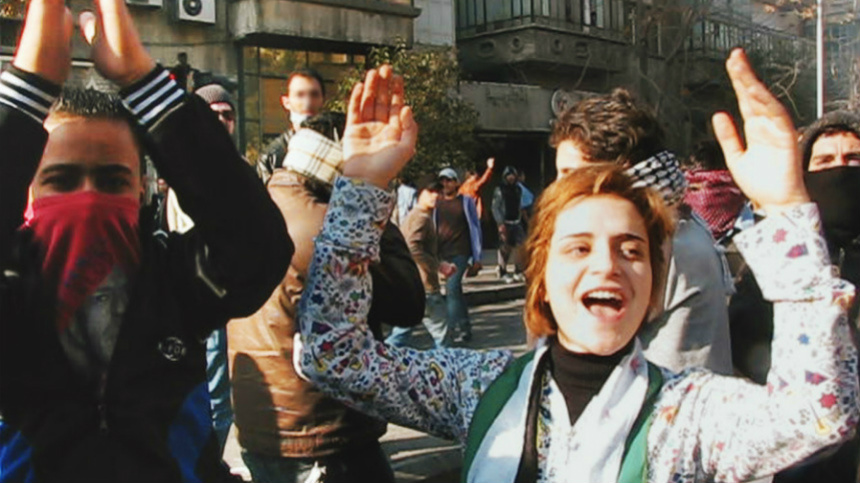Toronto 2016 Review: THE WAR SHOW Gives Filmmaking New Meaning in Syria

Women played a fundamental role during the Arab Spring in 2011, but their stories sadly often went untold. Notable exceptions to this trend were Gini Reticker's New York Times project Trials of Spring, however, Obaidah Zytoon's debut documentary The War Show provides new hope that we might now be on the cusp of a wave of important female perspectives from the Middle East.
Operating like an audio-visual scrap-book that moves between Homs, Damascus and the director's hometown of Zabadani, this rapidly escalating autobiography focuses on the experiences of Zytoon and her friends during the ongoing civil war. Often using freeze-frames that mimic a Polaroid camera, this film produces an authentic snapshot of revolution and introduces her friends with an understandably emotional nostalgia.
Once a risk-taking radio broadcaster, it soon becomes apparent that Zytoon clearly attracted a rebellious crowd and was perfectly placed to capture the spirit of a generation desperate for change. We see her bright-eyed group admirably championing freedom and gender equality, and fearing only God, they audaciously campaign for Assad's demise. Predominantly artists and educated youngsters, they are strongly united by a hatred of subordination and a love for novel experiences, and the things they experience are extremely eye-opening.
Together they go through a series of rites of passage, but in reality their trail-blazing lives sadly become dominated by the tragic events that occur following the uprising. The film divides these events into seven sections (“Revolution,” “Suppression,” “Resistance,” “Siege,” “Memories,” “Frontlines,” and “Extremism”), and this number seems unmistakably symbolic, as if the film was moving through seven stages of grief - all caught on whatever recording equipment was to hand.
The documentary has a very raw quality as a result, and it hastily fills the screen in a mixture of 1:66:1 and 1:78:1 footage. The War Show is therefore quite unlike the emotive, collected perspective that Reticker created in her project, but it is similar to the fly-in-the-soup sensations that Sean McAllister dizzyingly creates in his work. In other words, rather than being a passive observer, we're constantly wrapped up in a shaky filming style that places us right in the middle of the group's turbulent experiences.
It is no doubt an aesthetic dictated by the life-and-death situations which the film observes, making it very difficult to critique. But this doc's style is very compelling, and when combined with Zytoon's often poetic, moving voiceover, the experience is a lot like "dancing through a minefield," as the film puts it. Certainly, it can be difficult to follow the story of quite as many people as Zytoon focuses on in The War Show (approximately nine people including herself and an adorable dog named Fifi); but you hardly feel in a position to criticise her for wanting to commit the stories of so many lost friends to film.
And even if The War Show is at times hard to follow, when the friendship group begins to disintegrate, it definitely hits you like an emotional hammer. This is particularly true because the members of the group often eerily and pessimistically predict their own fates. But witnessing the demise of such a free-thinking group, after 40 years of dictatorship by the Assad family, is definitely hard to take.
That isn't to say that Zytoon's film is a misery fest that doesn't bare watching. Far from it. If anything, The War Show puts forward an uplifting message of defiance, and it puts forward a very important point about filmmaking. During its hundred minutes, The War Show demonstrates clearly how truth (and its representation in the media) becomes one of the very first victims of war. In this case, that's either because the regime produces doctored footage or because resistance fighters stage fake footage to use as a money generating gimmick.
So this doc clearly underlines the fact that one of the biggest things both sides have to fear is the camera. The camera that accurately captures their transgressions has the power to undo them. In Zytoon's savvy hands, then, filmming comes to be forever the greatest act of defiance, something which definitely changes the way you think about documentaries. What's more, in a climate where Syrians seem limited to choosing between starvation and obedience, the decision to capture the images in this film take on an immensely cathartic quality.
You can clearly see in The War Show a process by which people in the film are both equipping and arming themselves with ideas, a process that is at once both performative and one that helps them deal with their suffering. However, you can also sadly see a side of Syrian society that is slipping headlong into the hands of the ISIS movement, something which you hope films like this will be able to challenge when stability returns to Syria.
Having already won the Venice Days award at the Venice Biennale and playing at the Toronto International Film Festival, it definitely looks like this film will connect widely with international audiences who want to better understand the situation in Syria, in the meantime. Hopefully the attention this film earns will also enable Zytoon to shed further light on the situation as it evolves in future years.
The War Show
Director(s)
- Andreas Dalsgaard
- Obaidah Zytoon







